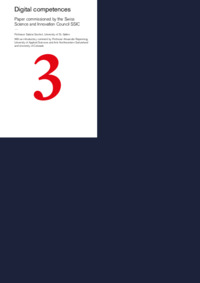Digital competencesPaper commissioned by the Swiss Science and Innovation Council SSIC
Publikationsdatum:
|
 |
 Diese Seite wurde seit 2 Jahren inhaltlich nicht mehr aktualisiert.
Unter Umständen ist sie nicht mehr aktuell.
Diese Seite wurde seit 2 Jahren inhaltlich nicht mehr aktualisiert.
Unter Umständen ist sie nicht mehr aktuell.
 Zusammenfassungen
Zusammenfassungen
 Digital transformation is currently the topic with regard to our
living and working environment. Digitalisation not only changes
the way we live and work, but also how we interact with others.
It will further introduce new ways of consuming and producing
goods and services. We certainly are in a situation of radical
change. However, what awaits us in the future is not clear.
At the same time, all industries will be affected by the digital
disruption, particularly health care, public administration, and
education (Becker, 2015; Becker, 2016; World Economic Forum,
January 2016).
Digital transformation is currently the topic with regard to our
living and working environment. Digitalisation not only changes
the way we live and work, but also how we interact with others.
It will further introduce new ways of consuming and producing
goods and services. We certainly are in a situation of radical
change. However, what awaits us in the future is not clear.
At the same time, all industries will be affected by the digital
disruption, particularly health care, public administration, and
education (Becker, 2015; Becker, 2016; World Economic Forum,
January 2016).Digital competences of leaders, employees, and citizens are key factors to successfully cope with this uncertain future (Becker & Knop, 2015; Johnson et al., 2016; Kienbaum Consultants International GmbH & Bundesverband Digitale Wirtschaft e.V., 2016; Studiengemeinschaft Darmstadt, 2016; Wachtler et al., 2016). But what exactly are digital competences? How can digital competences be operationalised and developed?
This paper thus focuses on digital competences. It will look at the status quo and identify relevant future directions. It is the aim of this paper to provide a solid orientation for educational policy makers, including the introduction of a digital competence framework. However, my paper cannot cover all aspects relevant to this complex topic. My intention is rather to identify the right questions to ask and to provide some orientation on how to move on to further investigate digital competences in a medium- to long-term perspective, and also to reveal possible “blind spots”. The aim is to survey the multiple dimensions of this complex subject in order to outline a fundamental approach for tapping the potential of “digital competences for 2030”.
 Dieses Kapitel erwähnt ...
Dieses Kapitel erwähnt ...
 Dieses Kapitel erwähnt vermutlich nicht ...
Dieses Kapitel erwähnt vermutlich nicht ... 
 Nicht erwähnte Begriffe | Computer, Curriculum / Lehrplan, Daten, Eltern, Kinder, Lehrplan 21, Primarschule (1-6) / Grundschule (1-4) |
 Tagcloud
Tagcloud
 Zitationsgraph
Zitationsgraph
 Zitationsgraph (Beta-Test mit vis.js)
Zitationsgraph (Beta-Test mit vis.js)
 Zeitleiste
Zeitleiste
 Volltext dieses Dokuments
Volltext dieses Dokuments
 Anderswo suchen
Anderswo suchen 
 Beat und dieses Kapitel
Beat und dieses Kapitel
Beat hat Dieses Kapitel während seiner Zeit am Institut für Medien und Schule (IMS) ins Biblionetz aufgenommen. Beat besitzt kein physisches, aber ein digitales Exemplar. (das er aber aus Urheberrechtsgründen nicht einfach weitergeben darf). Es gibt bisher nur wenige Objekte im Biblionetz, die dieses Werk zitieren.











 big data
big data Digitalisierung
Digitalisierung ICILS
ICILS Innovation
Innovation Intelligenz
Intelligenz Internet
Internet Internet der Dinge
Internet der Dinge Künstliche Intelligenz (KI / AI)
Künstliche Intelligenz (KI / AI) LehrerIn
LehrerIn Lernen
Lernen machine learning
machine learning PISA-Studien
PISA-Studien Problemlösefähigkeit
Problemlösefähigkeit Schule
Schule Schweiz
Schweiz Unterricht
Unterricht














 , 383 kByte)
, 383 kByte)  Biblionetz-History
Biblionetz-History